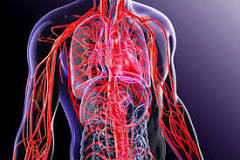The Importance of Blood Vessels in the Human Body
Our bodies are intricate systems composed of various organs and tissues that work together to maintain our health and well-being. At the core of this system are blood vessels, a network of tubes that transport blood throughout the body, delivering essential nutrients and oxygen to cells while removing waste products.
Blood vessels come in three main types: arteries, veins, and capillaries. Arteries carry oxygen-rich blood away from the heart to the rest of the body, providing vital nourishment to tissues and organs. Veins, on the other hand, transport oxygen-depleted blood back to the heart for reoxygenation. Capillaries are tiny vessels that connect arteries and veins, facilitating the exchange of gases, nutrients, and waste products between blood and tissues.
Without functioning blood vessels, our bodies would be unable to sustain life. The cardiovascular system relies on these intricate pathways to ensure that every cell receives the necessary resources for growth, repair, and energy production. Any disruption in this network can lead to serious health complications.
Conditions such as atherosclerosis, hypertension, and varicose veins can impact blood vessel function, compromising circulation and increasing the risk of heart disease, stroke, and other cardiovascular disorders. It is crucial to maintain healthy blood vessels through a balanced diet, regular exercise, and routine medical check-ups.
In conclusion, blood vessels play a fundamental role in sustaining human life by facilitating the circulation of blood throughout the body. Understanding their importance and taking proactive steps to support their health is essential for overall well-being.
Understanding Blood Vessels: Their Types, Functions, Health, Disorders, and Maintenance
- What are blood vessels and their role in the body?
- What are the different types of blood vessels?
- How do blood vessels contribute to cardiovascular health?
- What are common disorders affecting blood vessels?
- How can I maintain the health of my blood vessels?
What are blood vessels and their role in the body?
Blood vessels are a vital component of the human circulatory system, serving as a network of tubes that transport blood to and from various parts of the body. Their primary role is to facilitate the flow of oxygen-rich blood from the heart to tissues and organs through arteries, ensuring that cells receive essential nutrients and oxygen for proper function. Veins then carry oxygen-depleted blood back to the heart for reoxygenation. Capillaries, the smallest blood vessels, enable the exchange of gases, nutrients, and waste products between blood and tissues. Overall, blood vessels play a crucial role in maintaining proper circulation, supporting cellular health, and sustaining life within the human body.
What are the different types of blood vessels?
Blood vessels are crucial components of the circulatory system, responsible for transporting blood throughout the body. There are three main types of blood vessels: arteries, veins, and capillaries. Arteries carry oxygen-rich blood away from the heart to nourish tissues and organs. Veins then return oxygen-depleted blood back to the heart for reoxygenation. Capillaries, the smallest vessels, facilitate the exchange of nutrients, gases, and waste products between blood and tissues. Each type of blood vessel plays a unique role in maintaining proper circulation and ensuring that cells receive the essential resources they need to function effectively.
How do blood vessels contribute to cardiovascular health?
Blood vessels play a crucial role in maintaining cardiovascular health by serving as the intricate network through which blood is transported throughout the body. Arteries carry oxygen-rich blood from the heart to various tissues and organs, providing essential nutrients and oxygen for cellular function. Veins then return oxygen-depleted blood back to the heart for reoxygenation. Capillaries, the smallest blood vessels, facilitate the exchange of gases, nutrients, and waste products between blood and tissues. This seamless circulation ensures that every cell receives the necessary resources for growth, repair, and energy production, ultimately supporting overall cardiovascular well-being. Maintaining healthy blood vessels through lifestyle choices such as a balanced diet, regular exercise, and medical monitoring is vital for preventing cardiovascular diseases and promoting optimal heart function.
What are common disorders affecting blood vessels?
Common disorders affecting blood vessels can encompass a range of conditions that impact the structure and function of arteries, veins, and capillaries. Some prevalent issues include atherosclerosis, a condition where fatty deposits build up in artery walls, leading to narrowed or blocked blood flow. Hypertension, or high blood pressure, can strain blood vessels and increase the risk of cardiovascular complications. Varicose veins are another common disorder, characterized by swollen and twisted veins that may cause discomfort and affect circulation. It is essential to be aware of these conditions and seek medical advice for proper diagnosis and management to maintain vascular health.
How can I maintain the health of my blood vessels?
To maintain the health of your blood vessels, it is important to adopt a healthy lifestyle that supports cardiovascular well-being. Start by incorporating a balanced diet rich in fruits, vegetables, whole grains, and lean proteins to promote heart health and reduce the risk of plaque build-up in your arteries. Regular physical activity is also crucial for maintaining strong blood vessels and improving circulation. Avoid smoking and limit alcohol consumption, as these habits can damage blood vessels over time. Managing stress levels through relaxation techniques such as meditation or yoga can further support vascular health. Additionally, regular check-ups with your healthcare provider can help monitor your blood pressure, cholesterol levels, and overall cardiovascular function to detect any potential issues early on. By prioritising these lifestyle factors, you can take proactive steps towards keeping your blood vessels healthy and functioning optimally.

